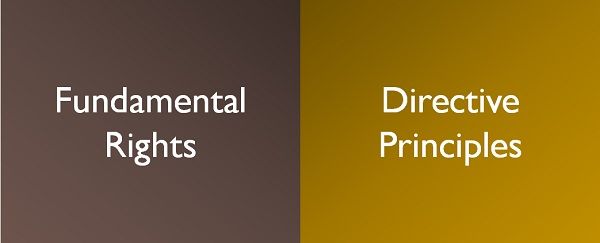Fundamental Rights | Directed principle state policy - FindYourAdvocate
Introduction
The Fundamental Rights and Directive Principles have typical inception. The Nehru report of 1928 which contained a Swaraj constitution of India joined some fundamental rights. These included such rights as the privilege of rudimentary instruction. The Sapru report of 1945 obviously separated the fundamental rights into two classifications justiciable and non-justiciable.
Sir B. N. Rau, Constitutional Advisor of the Constituent Assembly, prompted that the individual rights ought to be isolated into two classifications: those which can be upheld by a court and those which are not all that enforceable. The last he thought is 'good statutes' for the specialists of the State. His proposal was acknowledged by the Drafting Committee. Our constitution creators followed the model of the Constitution of Ireland which presents certain principles of social approach for the direction of the State yet which are not unmistakable by any Court.
I. Meaning of Fundamental Rights
Fundamental rights will be rights to having a respectable family. They are common rights which are in the idea of outside conditions fundamental for the best conceivable unfurling of the limits of a person. These made sure about and ensured conditions are called fundamental rights.
It commonly concurs that these normal rights are inalienable in man and can't be removed by the State. Common rights command higher holiness than other rights, for instance, rights dependent on contract since they exist free of any demonstration.
Part III of the Constitution, which contains fundamental rights, has been depicted as the Magna Carta of India. These fundamental rights generously spread all the conventional common and political rights specified in the Universal Declaration of Human Rights. Dr Ambedkar portrayed them as" the most condemned part "of the constitution. Equity Gajendragadkar depicted them as the "very establishment and foundation of the majority rule lifestyle introduced the nation by the Constitution".
Fundamental Rights were considered basic to ensure the rights and freedoms of the individuals against the infringement of the force appointed by them in their legislature. They are constraints upon all the forces of the legislature.
In the Maneka Gandhi case[1], Justice Bhagwati, saw as follows:
"these fundamental rights speak to the essential qualities valued by the individuals of this nation since the Vedic Times and they are determined to ensure the poise of the individual and make conditions in which each individual can build up his character to the furthest reaches. They weave a 'example of assurance' on the essential structure of common liberties, and force negative commitments on the State not to infringe on singular freedom in its different measurements".
These rights are viewed as fundamental since they are generally basic for the achievement by the person of his full savvy, good, and profound status. The target behind the consideration of them in the constitution is to set up "a legislature of law and not a man". The item is to build up the standard of law.
II. Directive Principles of State Policy (DPSPs)
The Directive Principles of State Policy contained in Part IV of the Constitution sets out the points and targets to be taken up by the States in the administration of the nation. The possibility of a government assistance state imagined by our constitution must be accomplished if the States attempt to actualize them with a high feeling of good obligation.
The genuine significance of Directive Principles is that they contain positive commitments of the State towards its residents. They are the beliefs which the Union and State Governments must remember while they figure and pass a law. The Directive Principles comprise a thoroughly political, social and financial program for a cutting edge popularity based state.
The primary target behind instituting them seems to have been, to set standards of accomplishments before the assembly and the chief, the neighbourhood and other specialists, by which their prosperity or disappointment can be judged. Assents behind the Directive Principles depend on sound constitutional and good commitments.
Constitutional commitments are made sure about by having Directive Principles as a necessary aspect of the Constitution. The greatest good power is a general sentiment which can uphold the directive principles and guarantee the administration's responsibility at the hour of decisions. Subsequently, sanctions behind Directive Principles are political.
Article 37 of the Constitution sets out that it will be the obligation of the State to apply these Directives in making laws. Articles 38 to 51 contain seventeen Directive principles. Articles 355 and 365 of the Constitution can be applied for upholding execution of Directive principles.
The Constitution contains directives in places other than part IV. These directives are similarly significant. Article 335 states that in making arrangements to administrations and posts in the legislature the cases of Scheduled Castes and Tribes will be mulled over, reliably with the support of proficiency of organization.
Article 350A charges the State and each nearby power to give offices to the guidance in the mother tongue at the essential stage for phonetic minorities. Article 351 says that it will be the obligation of the Union to advance the spread of Hindi language, to create it and to make sure about its enhancement.
III. What is Connection or Relationship between Directive Principles of State Policy and Fundamental Rights
The connection between Directive Principles and Fundamental Rights can be portrayed in an accompanying way.
Justiciability – The Directive Principles are non-justiciable, which implies they can't be implemented by the court and are explanatory in nature. Then again, Fundamental Rights are justiciable, that is they can be implemented by courts and are mandatory.
Instrument v. Restrictions – The Directive Principles are an instrument of the Government; they contain positive commands to the State to advance a social and government assistance State. The Fundamental Rights are constraints upon the State activities; they contain negative directives to the State not to do different things. Articles 14 and 21 are adversely phrased.
Administrative and Judicial activity – The Directive Principles are needed to be executed by enactment while Fundamental Rights are not needed to be actualized by enactment. The courts can't proclaim as void any law which is otherwise substantial on the ground that it repudiates any of the Directive Principles. Then again, the courts will undoubtedly pronounce as void any law that is conflicting with fundamental rights.
Popular government v. Communism The extent of Directive Principles is bigger. The directive principles set the rules, in the bigger enthusiasm of the network, for accomplishing communist objectives through fair techniques. They are social rights and relate to the monetary field. Fundamental Rights promises some essential rights to people. They are generally political rights which will in general control the State.
The spot the Directive Principles involved in the constitution versus the Fundamental rights has been a topic of debate for quite a while. The debate has now been set to rest by the Supreme Court.
Landmark Judgements
1. Province of Madras v. Champkam Dorairajan
In the State of Madras v. Champkam Dorairajan,[2] the request for Madras Government was tested. The reprimanded request fixed shares for affirmation in clinical and designing schools for various networks. The Government fought that the request was passed under Article 46 of the Constitution.
The Court held that "the Directive Principles of the State Policy need to adjust to and run as auxiliary to the part of Fundamental Rights", in light of the fact that the last are enforceable in the principles and DPSP'S can't abrogate the Fundamental Rights. Therefore, the Court held that the request for the Madras Government was invalid.
2. Re Kerala Education Bill
In Re Kerala Education Bill,[3] the court saw that however the Directive Principles can't abrogate the Fundamental Rights, nevertheless, in deciding the extension and ambit of Rights the court may not totally disregard the Directives yet ought to receive the guideline of agreeable development and should endeavor to offer impact to both however much as could be expected.
The 25th Amendment Act of 1971 significantly upgraded the significance of Directives. It brought about the expansion of Article 31-C to the Constitution of India which gave that a law to executing Directives contained in Article 39(b) and (c) couldn't be stuck down on the ground that it repudiated rights presented by Article 14, 19 or 31.
The 42nd Amendment Act of 1976 augmented the extent of Article 31-C to cover every single Directive Principle. Consequently, it offered priority to all the Directive Principles over the Fundamental Rights contained under Article 14, 19 or 31.
3. Keshavananda Bharti v. Association of India
In Keshavananda Bharti v. Association of India[4], the Supreme Court saw that the Fundamental Rights and Directive Principles are intended to enhance each other. It can well be said that the Directives endorsed the objective to be accomplished and Fundamental Rights set out the methods by which that objective is to be accomplished. Both are similarly significant however Directives are not legitimately enforceable by courts.
4. Minerva Mills v. Association of India










Comments
Post a Comment